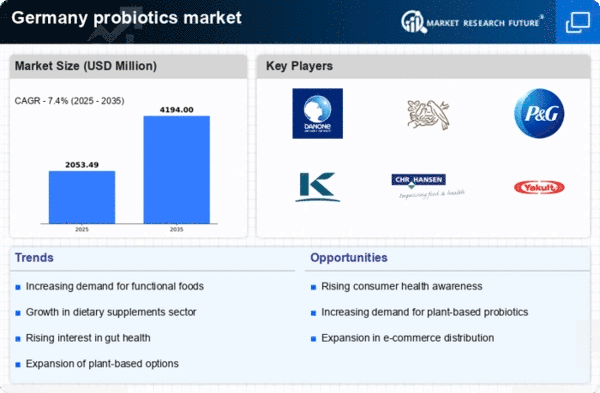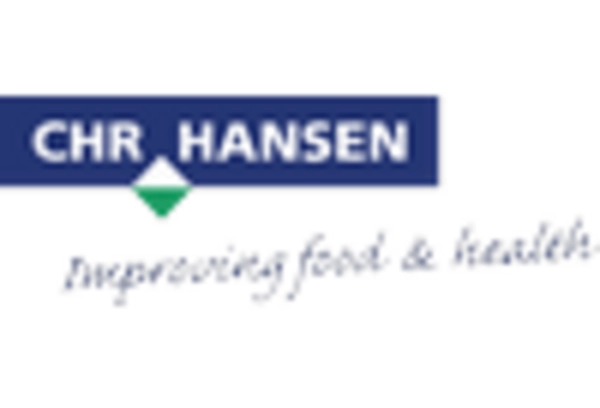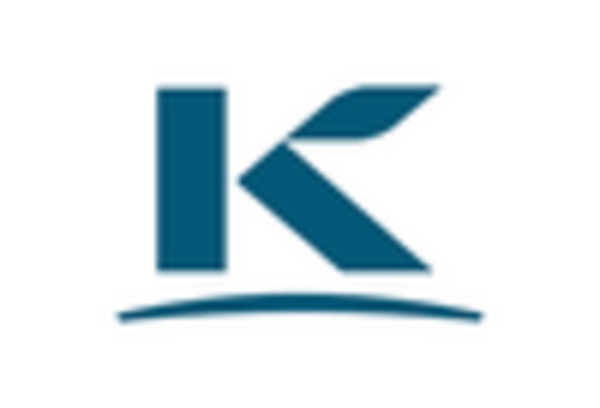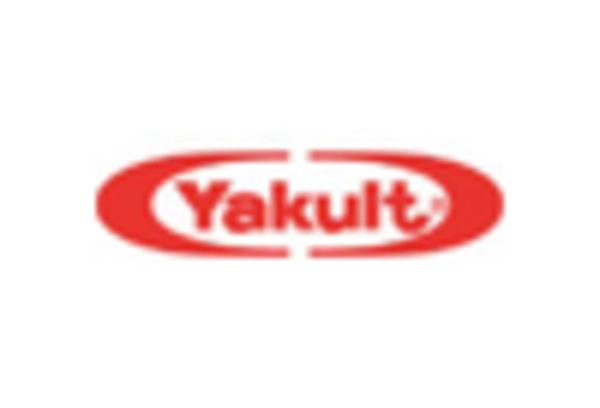Rising Popularity of Functional Foods
The trend towards functional foods is significantly impacting the probiotics market in Germany. Consumers are increasingly incorporating foods that offer health benefits beyond basic nutrition into their diets. Probiotics, known for their positive effects on gut health, are becoming a staple in various food products, including yogurts, beverages, and snacks. Market data suggests that the functional food sector is projected to grow at a CAGR of 7% over the next five years, with probiotics playing a crucial role in this expansion. This growing interest in functional foods is likely to drive innovation and diversification within the probiotics market, as manufacturers strive to create products that cater to the evolving preferences of health-conscious consumers.
Increased Focus on Preventive Healthcare
The shift towards preventive healthcare is significantly influencing the probiotics market in Germany. As healthcare costs continue to rise, consumers are increasingly prioritizing preventive measures to maintain their health. Probiotics, recognized for their potential to enhance immune function and overall well-being, are gaining traction as a proactive health solution. Recent surveys indicate that over 40% of German consumers are willing to invest in products that promote long-term health benefits. This growing emphasis on preventive healthcare is likely to drive demand for probiotic products, as consumers seek to incorporate them into their daily routines. Consequently, the probiotics market is expected to expand as more individuals recognize the value of maintaining health through preventive strategies.
Regulatory Support for Probiotic Products
Regulatory frameworks in Germany are increasingly supportive of the probiotics market, which may facilitate growth and innovation. The European Food Safety Authority (EFSA) has established guidelines for health claims related to probiotics, providing a clearer pathway for manufacturers to market their products. This regulatory clarity appears to encourage investment in research and development, as companies seek to validate the health benefits of their probiotic offerings. Furthermore, the German government has been promoting initiatives aimed at enhancing public awareness of gut health, which could further stimulate demand for probiotic products. As a result, the regulatory environment is likely to play a pivotal role in shaping the future landscape of the probiotics market in Germany.
Growing Interest in Personalized Nutrition
The increasing focus on personalized nutrition is emerging as a significant driver for the probiotics market in Germany. Consumers are becoming more aware of the unique dietary needs based on individual health profiles, leading to a demand for tailored probiotic solutions. This trend is supported by advancements in microbiome research, which suggest that different individuals may require specific strains of probiotics for optimal health benefits. Market analysts indicate that the personalized nutrition segment is expected to grow by 10% annually, with probiotics being a key component of this trend. As consumers seek products that align with their personal health goals, the probiotics market is likely to witness a surge in demand for customized probiotic formulations.
Increasing Demand for Digestive Health Solutions
The growing awareness of digestive health among consumers appears to be a primary driver for the probiotics market in Germany. As individuals increasingly seek natural remedies for gastrointestinal issues, the demand for probiotic products has surged. Recent data indicates that approximately 30% of the German population actively seeks digestive health solutions, which has led to a notable increase in probiotic product offerings. This trend is likely to continue, as consumers become more educated about the benefits of probiotics, including improved gut health and enhanced immune function. Consequently, manufacturers are responding by developing innovative probiotic formulations tailored to meet the specific needs of health-conscious consumers. This shift in consumer behavior is expected to significantly influence the growth trajectory of the probiotics market in Germany.

















Leave a Comment